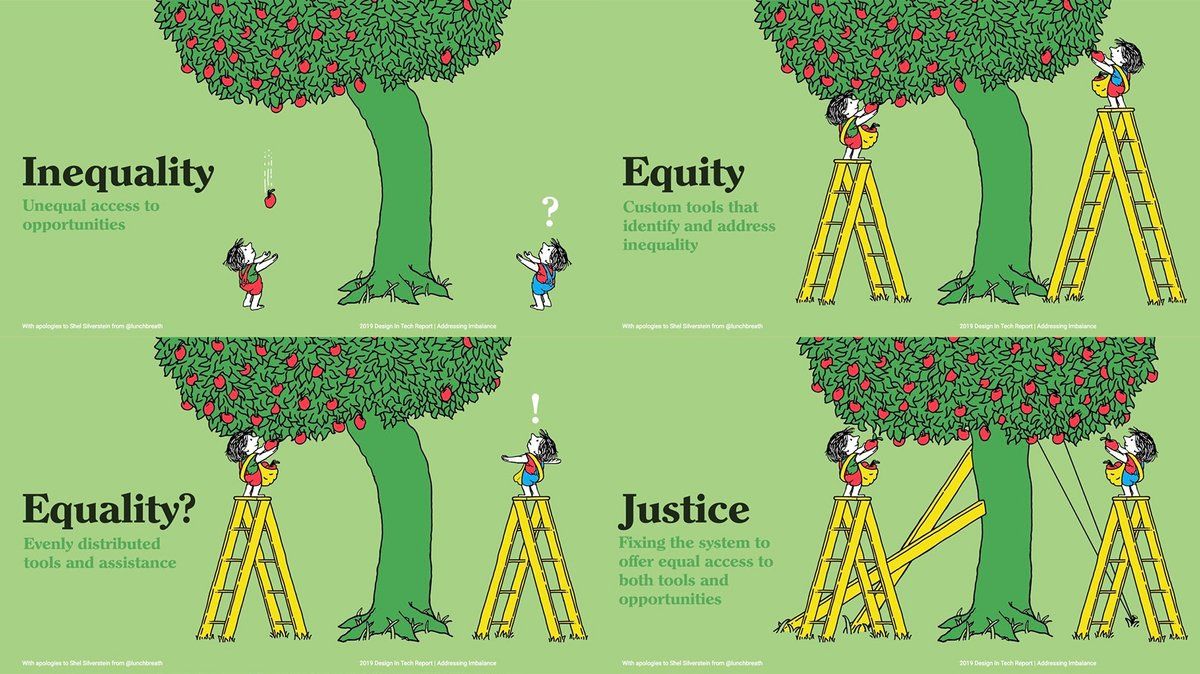Equity vs Equality - What should we be asking for?

Equity and equality are two different concepts that are often used interchangeably in the workplace, but they have distinct meanings and implications.
Equality refers to treating everyone the same regardless of their background, needs, or circumstances. In the workplace, equality would mean treating all employees equally and providing them with the same resources, opportunities, and benefits.
On the other hand, equity refers to providing individuals with the resources and opportunities they need to achieve the same outcomes as others, even if that means treating them differently based on their circumstances. In the workplace, equity would mean taking into account individual differences and providing additional support, resources, or accommodations to level the playing field and ensure that everyone has an equal opportunity to succeed.
For example, providing a ramp for employees with disabilities to access the office is an example of equity, whereas treating all employees the same, even if some have disabilities, would be an example of equality.
In summary, while equality aims to treat everyone the same, equity recognises that different people have different needs and provides additional support to ensure equal outcomes.
So what should we be asking for to reach equity in our workplace?

There are several things that we can ask for:
- Fair hiring practices: Companies should ensure that their hiring practices are fair and unbiased, and that they provide equal opportunities for all candidates, regardless of their background.
- Equal pay: All employees, regardless of gender, race, or ethnicity, should receive equal pay for equal work. This means that companies should conduct regular pay equity analyses to identify and address any pay disparities. Ask to see the Gender Pay Gap report for your organisation.
- Flexible work arrangements: Flexible work arrangements, such as telecommuting or flexible hours, can help to ensure that employees with caregiving responsibilities or other personal needs are not unfairly disadvantaged.
- Diversity and inclusion training: Companies should provide training to all employees to promote diversity and inclusion in the workplace. This can help to raise awareness of unconscious biases and help to create a more inclusive workplace culture.
- Career development opportunities: Companies should provide equal access to career development opportunities, such as training programs, mentoring, and promotion opportunities, to all employees. Allowing for reasonable adjustments to accomodate those with addtional requirements above the standard provision to make these accessible to all.
- Support for underrepresented groups: Companies should provide additional support and resources to underrepresented groups, such as women and people of colour, to ensure that they have equal opportunities to succeed.
- Accountability and transparency: Companies should hold themselves accountable for promoting equity in the workplace and be transparent about their efforts to do so. This can include setting diversity and inclusion goals and regularly reporting on progress towards these goals.
How can you champion equity for yourself and others?
Having regular development conversations with your manager is a start. Update them on changing needs so they have the opportunity to work with you in finding equitable solutions.
There are many more ideas and we would love to hear yours. We invite you to our fist Community Connect on 7th March at 4pm on-line to discuss 'Embracing Equity' which is the theme for International Women's Day on the 8th March.
Come and celebrate International Women's Day with us.